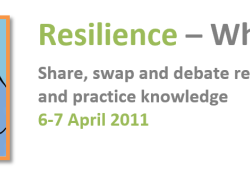Boingboing blogs from… the Resilience Forum!
Taking a public health approach to resilience in young people – Ann Hagell & John Coleman, Association for Young People’s Health, Brighton Resilience Forum – Thursday 3 November 2016
by Angie Hart and Liz Halstead, Boingboingers
Lots of different people at the Resilience Forum today to listen to Ann Hagell and John Coleman speak about their resilience toolkit, which they were funded to make for Public Health England. They’re from the Association for Young People’s Health (AYPH). Thirty plus people who have an interest in resilience have come together to discuss the wonderful world of resilience. A mix of teachers, students, student teachers, policy makers, academics, parents, young people and practitioners. It’s a special day today because it is the first time that Laura, one of PhD student Anne Rathbone’s co-researchers with learning difficulties, is co-hosting the Forum. Anne and Laura are a comedy duo and are quick to sell their Sun & Clouds Game on the BB website. Laura’s helped get a very jolly atmosphere going and Anne and Laura have explained about our jargon sheet and how we try to use language that is as inclusive as possible. And we can all get involved with the tea break for sure where we have a good old natter and get to know more about each other’s work.
As the presentations begin, there is relief across the room that everyone made it despite the southern trains. Ann Hagell starts with some mainstream definitions of resilience, including a good outcome in the face of severe challenge. The idea of transforming toxic stress into tolerable stress is also highlighted. We are also talking about focusing on young people and the difference between young people and adults, in terms of resilience definitions.
They have developed a public health approach to resilience building. Public health is defined in partnership with local communities, and is community needs-led and evidence-based. Public health combines universal and targeted outcomes, and they produced their framework with an eye to the public health outcomes framework. This does explain the different elements that need to be in place to support young people’s resilience building. Apart from individual skills development, the availability of suitable and expert services and resources is fundamental to resilience building. Ann says more practitioners should be taught about the needs of young people, GPs for example don’t get trained in puberty. So for them this approach means lots of working in partnership and lots of local resources.
Young people experience many pressure and stressors, poverty and deprivation. 1.9 million young people aged 10-19 years live in the most deprived areas of England. For their toolkit, AYPH built up a list of pressures that young people face. A familiar list included poverty and depression, maltreatment and neglect, parental psychopathology, long-term health condition, family disruption, bullying and social media, peer problems, academic pressures, pressures on body confidence… Oh blimey, the list is getting very long and we’re all feeling a bit glum, especially after Laura’s cheery introduction. Interesting that disabilities, LGBTU+ identities and racial discrimination weren’t on their list. Public health is supposed to be reducing hospital admissions for 15-24 years old, reducing pregnancies and reducing obesity. Will improving resilience in young people help improve these public health outcomes?
Questions were posed such as, can we say whether someone is resilient or not? Is it circumstantial? Are people resilient in one situation or possess resilience in certain domains? Why is the public health approach important? How do we think about resilience in a public health context? It involves the development of individual skills, access to the right information at the right time, availability of suitable services and resources when they are needed, tackling the wider determinants of unequal health outcomes. It also means reducing inequality at the wider levels, and broader resilience thinking that is very youth orientated.
What expert services are available for young people? These should be things that fit around young people’s lives, linking local health services with voluntary sector provision, emphasising youth friendly approaches, and providers who are trained in adolescent development. Many medical professionals are not taught about young people, puberty etc. This relationship means lots of community-based stuff. All the basics are covered in the wider determinants of unequal health outcomes, from the individual level stuff to the wider community, such as living and working conditions. John’s got a great example of a place in Hertfordshire where they have health advisors on the school buses to talk young people so they really are going to where the young people are at.
How do we make it happen? It’s about leadership and local politicians having a common knowledge of resilience, knowing what young people need and saying that it needs to happen. Making sure we know what the needs are in that area, the stress points and transitions, and a local culture that prioritises resilience, using toolkits and resources.
Ann is passionate about the fact that adolescence is a different life stage to others and needs a specific approach. Adolescence and early adulthood represent a critical life stage, not about reducing risk, but helping people bounce back, focussing on more than individual skills, listening to what young people want, and not defining young people by the challenges they have faced. It’s not a one size fits all. It is a mindset and an approach, not a quick fix.
Discussion then happened in pairs, and the room was buzzing. Discussions about different public health professionals coming together, the top down vs bottom up approach. Josh Cameron from the Boingboing network asked about how their approach dealt with social determinants; he made an important point that simple things like providing school meals to young people is reducing risk and enhancing resilience. Ann said the idea that the commissioners wanted was to support the resilience of the whole adolescent population. A very dynamic new doctoral student with a teaching background brought up the issue of resilience measures and Ann said it was very tricky to measure indeed.
John Coleman’s up now, and says he is working on materials to help practitioners understand the adolescent brain, and some resources for young people too. Sarah Chamberlain says that in Rotherham they need to introduce resilience relationship education in school to reduce the amount of vulnerability in young women in Rotherham. The controversial Rotherham sex ring circle was brought up; is it going to reduce the risk of young people to enhance resilience? In this case, is resilience building after sexual violence successful? John wasn’t sure that would help with the problems of sexual exploitation of young women in Rotherham, but he found it interesting to hear an MP talking about young people’s resilience. John says he doesn’t think it is useful to think about resilience in terms of everyone’s lives and those of the most disadvantaged people in the same way. Lots of muddles on this he says.
John talks about four different approaches to resilience building. These are the TEAM of Life, Friends for Life, Healthy Minds and Professional learning communities. The TEAM of Life is a narrative approach to building resilience and they get young people to talk about their lives in sports narratives. So metaphors such as, “Who is your goal keeper?” and, “Who is your defender?” This was a small study but they showed that success was achieved when resilience was defined as goal-directed behaviour and reduction in externalising and internalising problems.
John then talks about PENN and Friends for Life. I’ve got “déjà vu” here. First to the overview of resilience approaches that Becky Heaver and I have done, which included these approaches. Take a look if you like, we’ve tried to make it as easy to read as possible. These are both about individual coping etc. Healthy Minds, which John has co-developed, takes the view that resilience has to be part of something much wider. John says he’s very proud of this programme. They’ve got 36 schools involved and they are three years into a five year programme. They think that the resilience element, which is delivered through the PENN resilience programme, should be delivered as part of a wider PSHE programme. The overall programme includes managing the work around me, moving towards my future, taking control of the decisions I make, and planning for the future. John thinks this is completely unique and no other PSHE programme has done this as far as they know. They have £2m funding for this programme and most of it has gone into supporting the teachers.
John edited a special issue of the Oxford Review of Education in 2009 called “Well-being in Schools”. He passionately believes in nurturing the teachers as well as the students. Our fabulous Josie Maitland is doing her PhD on this very topic so I’m sure they will have a good chat afterwards in the coffee bar.
In the question and answer session it is good to hear that John is committed to making their programme free for people to use, and it sounds like he’s got some funding for that to happen, apart from the American bits they’ve been using.
It was great to have them here, and to hear about their charity, the Association for Young People’s Health. Let’s hope they come back again soon.


